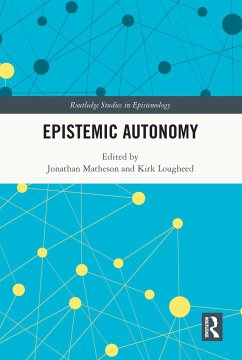
The Routledge Handbook of Feminist Philosophy of Science

PAYBACK Punkte
26 °P sammeln!
The Routledge Handbook of Feminist Philosophy of Science is a comprehensive resource for feminist thinking about and in the sciences. Its 33 chapters were written exclusively for this Handbook by a group of leading international philosophers as well as scholars in gender studies, women's studies, psychology, economics, and political science.The chapters of the Handbook are organized into four main parts:I. Hidden Figures and Historical CritiqueII. Theoretical FrameworksIII. Key Concepts and IssuesIV. Feminist Philosophy of Science in Practice.The chapters in this extensive, fourth part examine...
The Routledge Handbook of Feminist Philosophy of Science is a comprehensive resource for feminist thinking about and in the sciences. Its 33 chapters were written exclusively for this Handbook by a group of leading international philosophers as well as scholars in gender studies, women's studies, psychology, economics, and political science.
The chapters of the Handbook are organized into four main parts:
I. Hidden Figures and Historical Critique
II. Theoretical Frameworks
III. Key Concepts and Issues
IV. Feminist Philosophy of Science in Practice.
The chapters in this extensive, fourth part examine the relevance of feminist philosophical thought for a range of scientific and professional disciplines, including biology and biomedical sciences; psychology, cognitive science, and neuroscience; the social sciences; physics; and public policy.
The Handbook gives a snapshot of the current state of feminist philosophy of science, allowing students and other newcomers to get up to speed quickly in the subfield and providing a handy reference for many different kinds of researchers.
The chapters of the Handbook are organized into four main parts:
I. Hidden Figures and Historical Critique
II. Theoretical Frameworks
III. Key Concepts and Issues
IV. Feminist Philosophy of Science in Practice.
The chapters in this extensive, fourth part examine the relevance of feminist philosophical thought for a range of scientific and professional disciplines, including biology and biomedical sciences; psychology, cognitive science, and neuroscience; the social sciences; physics; and public policy.
The Handbook gives a snapshot of the current state of feminist philosophy of science, allowing students and other newcomers to get up to speed quickly in the subfield and providing a handy reference for many different kinds of researchers.














